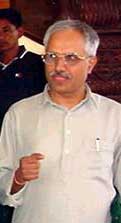 The Maoists seem ready to talk, how do you feel about this?
The Maoists seem ready to talk, how do you feel about this? It's a positive sign, but we still have to be clear about their motive. They appear to be more flexible this time, indicating a change in their viewpoint. But until we figure out why they switched suddenly from talks to violence in the past, people will suspect their motives. Perhaps they are trying to correct their past wrongs.
Should the government agree to the Maoists' proposal?
The government should use this to move the process of talks forward. It has to try and gauge whether the Maoists' proposal is sincere. The government should not reject the proposal outright, but I feel the prime minister is doing so.
Is there a greater need for talks now?
Of course. We can't continue with the damage that is going on. The Maoists must also understand that there is no possibility of taking control of the state. From a national and international point of view, it just isn't possible. And I think it will be hard for the government to quell the situation with force.
The Maoists' and government's actions have made trust impossible. In this context, if talks are held and no resolution is reached, won't other political powers be suspicious?
We have to learn lessons from past experiences, correct past weaknesses, and move the talks in the right direction, even if it means changing their format. An all-party meeting will likely raise questions about the failure of earlier talks in the very first round. And they should rightly be able to do so.
Responsible individuals in government have said that UML and Congress leaders who make contact with Maoists should be imprisoned. Does this indicate government opposition to talks?
It indicates government leaders are putting forward their views irresponsibly. There's the internal party dispute, and there is this national crisis. The government should not use these circumstances to fulfil its own self-interest.
Both factions [of the Nepali Congress] maintain that they are 'the party'. Has the Congress actually split?
The Congress has been unable to split in a legal and formal sense. Despite his talk, the prime minister hasn't been able to form a separate party. In the legal context, the case is before the election commission. The government media expresses one point of view. Other public media express another.
It isn't good for the nation that the Election Commission is delaying tackling such a political case, is it?
Not at all. We don't know what the commission is doing; it hasn't sought opinions. If they said that they needed time to deal with a case of such national importance, that would be something. Their style of working is not transparent.


